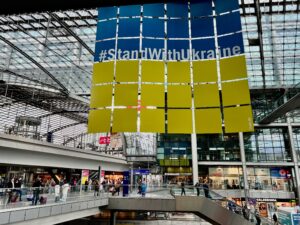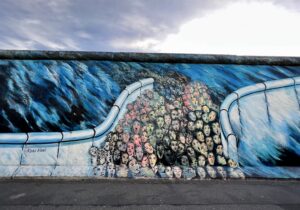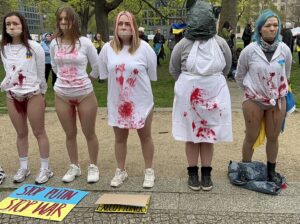Issue of the Week: War, Human Rights



Berlin, Ukrainian refugee PSAs, copyright 2022 Planet Earth Foundation
What do you think of when you think of Berlin?
1939. Hitler and the Nazis launching the horrors of World War Two. Countless millions killed. The Holocaust.
1945. The defeat of fascism, the foundational work to create the United Nations and the genesis of the Cold War with Stalin and Soviet Russia.
1961. The newly built Berlin wall to keep the people of Russian-controlled East Berlin and others from leaving the brutal totalitarian Russian backed state of East Germany they lived in and access to leave from other Soviet controlled Eastern European countries. West Berlin became a global symbol of freedom and resistance to tyranny. President Kennedy’s famous 1963 words in a Berlin speech electrifying half a million people “Today, in the world of freedom, the proudest boast is “Ich bin ein Berliner” (I am a Berliner) and President Reagan’s famous 1987 words in a Berlin Speech “Mr. Gorbachev, tear down this wall!” book-ended this era.
1989. The stunning fall of the Berlin Wall and the end of the Cold War, when suddenly global democracy and human rights seemed possible, even inevitable. At first yes, then increasing inequality, nationalism and the lack of international cooperation in addressing major issues undermining everything.
2016. After the West and the world failed to take meaningful action to stop the killing of half a million people and displacement of over half of the population of Syria by its dictator Assad and Russia’s Putin who kept him in power by carrying out brutal war crimes, Germany took in more Syrian refugees (and others) by far than any other European nation. The late Amos Oz and many others declared Berlin the new capitol of the free world in the wake of this, Brexit and Donald Trump’s apparent abandonment of the international based goals World War Two had been fought to achieve, which, despite many flaws, had kept global war from re-occurring and created progress or the possibility of international cooperation on progress on the issues of basic human needs and rights and planetary sustainability for over seventy five years.
2022. Berlin, as the capitol of the most prosperous and strongest European nation, became the linch pin of European and NATO resolve, with more unity than since the Cold War, to oppose Russian aggressian in Ukraine. Germany again welcomed huge numbers of refugees, this time from Ukraine. Officially about 400,000 as we write, unofficially far more, and growing. With all its contradictions and flaws, the government has taken increasingly unprecedented actions to support Ukraine, along with the US and other NATO nations and democracies around the world.
Berlin has also become the center of Ukrainian refugee activism, led in the main by progressive millennial and gen Z women.
For Ukrainian refugees, activists, and all Berliners in some ways, the war and Russian atrocities in Ukraine are not academic. They are only a few short hours away, intermingled with the memories of the worst traumas in history, and for many they are the deepest of ongoing personal traumas every day.
Two of us from Planet Earth Foundation just returned from two weeks in Berlin on a research and production mission–Keith Blume, founder and principal, the creative director, director and primary researcher, and Clara Lippert, volunteer project director, the video/photojournalist and associate researcher–to support Ukrainian refugees, create public service announcements and eventually, depending on funding, documentaries on the impact of Putin’s wars, the Russian invasion and genocide in Ukraine. We hope to go back, into Ukraine, and other nations, to more fully record and tell the story as it unfolds.
All the pain and dangers on the planet continue and each person deprived of basic needs and human rights is equally important and sacred. It is also true that some times and some places and some events have a more wide-ranging impact than others. And once in a great while, such an event has the potential to impact the entire world and history itself more than the others. The convergence of realities in the Russian invasion of Ukraine has created the worst danger to all other issues of import, and perhaps out of the anvil of this danger, eventually, the greatest opportunity. All this will be commented on further, as will the many experiences related to this project.
One of the projects we hope to finish soon are presentations of parts of the numerous interviews we did. The bravery, heart and intelligence of those we met was incomparable. People who had been through everything, yet were not only survivors, but multi-dimensional truth seekers, fighters for justice guided by principles of “sustainable peace”–activists with the endless fortitude of all the great activists in history in their support for refugees, those at risk in Ukraine and the issues at stake for the whole world.
One example bears mention here. On our last full day, we interviewed a twenty-year old woman who has just left the war zone in Ukraine and was part of a demonstration protesting Russian use of sexual violence as a weapon of war against children, women and men. She was camera shy and traumatized terribly, but wanted to talk, wanted to prepare herself. Work herself up to it. An organizer who had helped us at the start of our journey was there at the end as part of this protest. She spoke briefly with the woman in Ukrianian, encouraging her, who had just begun the interview with our video/photojournalist, also a woman with endless empathy and compassion for this woman and these issues. At the start, the twenty-year old Ukrainian refugee told the story of how she had just come from the nightmare of Ukraine, that her father remained to fight, and was one of those trapped in the steel factory in Mariupol–the last she knew. Contact was impossible now.
Imagine being this woman. Now decide if you are going to be part of a world that does everything possible to end this genocide which has put the whole world on the knife’s edge. There lies all the danger. And all the possibility.
Here are the public service announcements put together in days with our team now joined by the extraordinary effort of our producer/editor in Seattle, Lisa Blume, foundation principal and long-time producer of award-winning media campaigns, after the return of the Planet Earth Foundation team from Berlin. More will come. We produced our initial PSA on Ukraine shortly after the Russian invasion here.
The first of this new group of PSAs is on the war crime and crime against humanity of sexual violence being perpetrated by Russian soldiers against children, women and men.
The second is on the need for the world to support the over 5.5 million Ukrainian refugees and 11 million displaced Ukrainians within Ukraine.
Here they are: